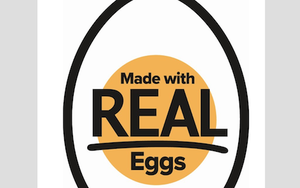
With no shortage of egg substitutes on
the market, the American Egg Board (AEB) is bolstering its support of U.S. egg producers by introducing Made With REAL Eggs certification for products containing genuine domestic eggs.
The
Made With REAL Eggs rollout follows pilot tests at White Castle QSR locations and 7-Eleven convenience stores. It comes as consumer demand for eggs and egg products is the highest in 50 years,
according to Phaedra Ruffalo, senior director of market development at the AEB.
“We know and appreciate the care that consumers take when making food choices to make for themselves and
their families,” Ruffalo tells Marketing Daily.
The AEB cites research by Datassential showing that more than 80% of people who buy egg products indicated that seeing a
Made With REAL Eggs seal would positively influence their purchase decision. Additionally, 82% felt the seal provided confidence that a manufacturer’s brand was high quality and that a product
would taste better (80%).
advertisement
advertisement
“We developed the seal in response to increasing demand from our food service operators and food manufacturers for clean labeling and transparency to their
customers,” says Ruffalo. “Consumers want to know that they have high-quality, authentic ingredients in their food.”
There are two seals from the AEB: one for use with
packaged foods and the other for foodservice menus. They can be used on packaging, in marketing and merchandising materials, on menu boards and for promotional efforts in retail outlets. Each
individual product or SKU using the seal must be registered annually, gratis.
According to the certification standards, “eggs and egg products therein must be made from U.S.-farmed
eggs” and the seals “cannot be used on products that use vegetable/legume proteins or vegetable/legume oils to replace an egg component.”
Among the AEB's efforts to promote
real domestic egg consumption are videos suggesting eggs as lunch and dinner items. For the latter, the organization distributed a video
titled “Nightshifters: The Dinner Eggs Phenomenon,” from the agency Energy BBDO with support from Ketchum.
The video shows “dinner egg farmers” Tom and Tracy Smith, who
relate the discovery that they have “night shift hens” who—contrary to eons of chicken behavior—actually lay eggs after dark, resulting in an oversupply of their edible
output.